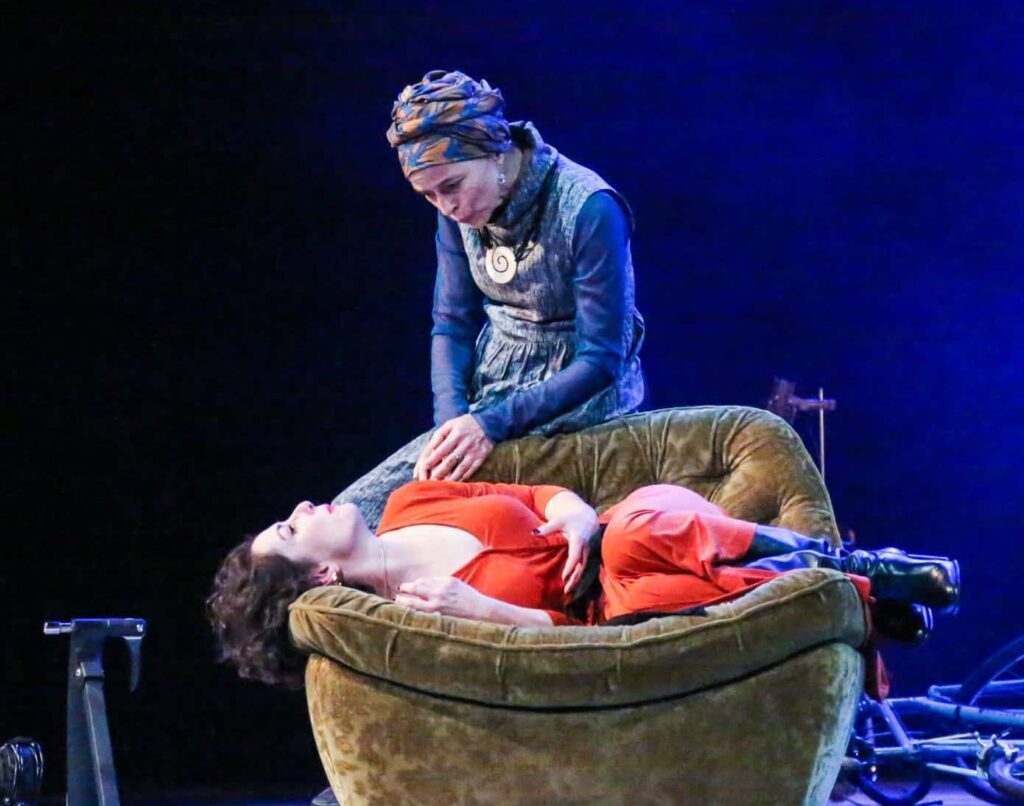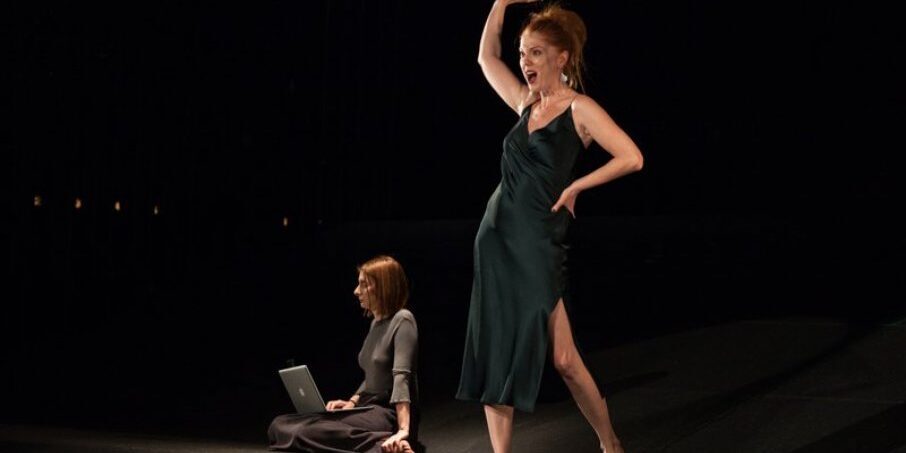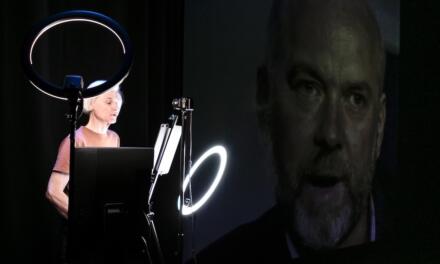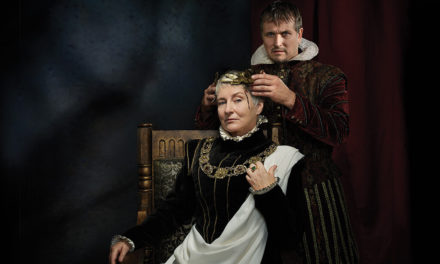Across the western Balkans women are raising their voices against violence following a series of high-profile rape allegations. Natasha Tripney looks at how a Bosnian theatre festival in Brčko became the focal point for women’s resistance and solidarity.
On December 26, the hashtag #nisamprijavila (I did not report) started trending on Twitter as women across the Balkans used it to recount incidents of historical sexual abuse and harassment. Thousands of women used it to share often harrowing stories of domestic violence, abuse, coercive control, humiliation and a system that repeatedly lets down the victims.
The impact of the MeToo movement has only been felt in the Balkans to a certain extent. In part this is because, as a movement, it is western-centric and doesn’t always encompass or address non-western societal and cultural contexts. But there is a growing resistance to patriarchal structures and systems in the region, women growing increasingly weary with having to out up with certain behaviors and practices. As has been the case in many countries, the theatre and entertainment industries have become focal points. Several women have come forwards with stories of abuse, assault, and an entrenched culture of harassment, going back years, sometimes decades.
In Serbia, one of the most prominent cases of this concerns the actor Danijela Štajnfeld. Her documentary film Hold Me Right, premiered during last year’s Sarajevo Film Festival. In the film she talks to survivors of rape and discusses her own rape some years earlier by a well-known Serbian actor, though she did not reveal his name. Only in March this year, before the scheduled Serbian premiere of the film, did she reveal that her rapist was Lečić, who is also a former Minister of Culture.
It is Štajnfeld’s story, along with the case of the Belgrade acting teacher Miroslav Aleksić – who has been accused of rape by nine of his former students – that has driven forward the conversation surrounding rape, sexual abuse, and accountability both within the Serbian theatre scene and in the country as a whole.
Štajnfeld reported her rape to the High Public Prosecutor’s office in Belgrade but though she had a recording of Lečić seemingly discussing the rape, her case was eventually dismissed due to insufficient evidence. The story did not end there. Lečić responded with a smear campaign in the media, claiming the whole story was politically motivated. The tabloids ran salacious stories about Štajnfeld’s character and past.
Then, earlier this year, something of a flashpoint took place when it was revealed that Lečić was to be a member of the jury at the 38th edition of the Susreti Theatre Festival in Brčko, Bosnia and Herzegovina – something that the festival participants had not previously known about.
What followed was quite extraordinary – a mass rejection of collective gesture of solidarity. The first to act was the director Alisa Stojanović and the creative team of 64, the new play by Tena Štivičić, produced by Belgrade’s Atelje 212. Stojanović requested that the production be withdrawn from the competition after the first performance. This decision was announced via a letter read immediately after the first performance of the play, which they went ahead with out of respect for the audience. Given Lečić’s treatment of Štajnfeld, they stated that they “cannot consider him in any way a person who can evaluate our work, nor do we want to allow it.”
While it is true that Lečić has not been charged, the situation is complicated. Historic rape cases are notoriously difficult to successfully prosecute. It is also true that courts in Serbia frequently impose the minimum sentence in rape cases – sexual harassment only recognized as a crime in 2017 – and that Štajnfeld has been monstered in the press and on social media both for speaking out, and not speaking out sooner. It felt like an act of gross insensitivity to include him on the panel.

64 by Tena Štivičić, Photo: Atelje 212.
According to Croatian theatre portal Teatar.hr, instead of addressing the company’s concerns regarding Lečić’s presence as a jury member, the festival, under the directorship of Jakov Amidžić, took offence at the actions of Stojanović. Instead of listening and engaging, they republished a piece by a local media outlet that dismissed the decision to withdraw 64 from competition as one of “arrogance.” Commentators accused the Serbian theatre of airing its dirty domestic laundry in a different country.
The actions of Stojanović started a wave. More productions followed suit, including Schindler’s Lift, produced by Sarajevo’s Chamber Theater 55, directed by Kokan Mladenović. Next the team behind Seven Fears produced by BNP Zenica, and directed by Selma Spahić, also made the decision to withdraw based on the way the festival had responded to the situation.
Things continued to escalate as several directors, actors and writers published open letters in response to the situation including the director Dino Mustafić, the actor Ermin Bravo and Štivičić herself. But the festival merely doubled down, dismissing the concerns of the participating artists. Mustafić’s suggestions that one solution might be to forgo the judging process for this year, was rejected outright by Amidžić. As Štivičić, points out, “the festival director, the jury members, the festival selector and some of the newspaper contributors who wrote the most damning pieces about our decision to step out of the competition are all men of a certain age and have utterly failed to understand how momentous and far reaching the events were, which were playing out before their eyes. It is understandable that the dinosaurs are feeling anxious in this sensitive moment of extinction.”

Schindler’s Lift, by Chamber Theatre 55 Sarajevo.
At the same time Štivičić also highlights the allyship on display, to point out that it was not just the companies led by women who took a stand. “It is really important to say,” she stresses, “the next people to join the protest by withdrawing from the competition and unequivocally condemning Lečić’s presence on the jury were two men: Kokan Mladenović and Darko Cvijetić, director and playwright of a play Schindler’s Lift, which deals with honouring and giving a voice to many victims of crimes, in part also of sexual assault.”
In the end every performance except one, which was absent because one of the actors had Covid-19, withdrew from competition either because of Lečić’s presence on the jury or because of how the festival handled to the situation, what Štivičić describes as the “unacceptable tone” taken in their responses. Lečić’ himself did not withdraw from the jury, despite the criticism levelled against him, though another jury member, the playwright Almir Imširević, did eventually resign.
Lečić has met with resistance elsewhere. He was removed from the ensemble of Belgrade Drama Theatre’s productions of Kad su cvetale tikve at the behest of the other actors. At the same time, he continues to work. He will be performing at the Yugoslav Drama Theatre in January. For all the talk about cancel culture, the careers of men in positions of influence often prove remarkably durable.
Theatre is an industry in which men still occupy more positions of power than women and it is often an environment in which abusive behaviour and bullying can flourish unchecked. The work itself requires trust and intimacy and this can be exploited. The UK actor Madelaine Worrall writing in The Stage, described this “casual warping of behavioural boundaries” as endemic. Over recent years there have been several high profile cases in which men have abused their power including Kevin Spacey, the Hollywood actor and former artistic director of the Old Vic Theatre in London; Max Stafford Clark, the former director of the Royal Court theatre, who was ousted as artistic director of Out of Joint in 2018 following complaints of harassment and inappropriate behaviour against him from several female employees; and Michael Colgan, the former artistic director of the Gate Theatre in Dublin, who was accused of harassment and bullying.
This power imbalance in the industry means that victims still find it difficult to come forwards, justifiably worrying about the impact doing so will have on their careers as well as their emotional wellbeing. In the absence of structural accountability. It is easy to see why hashtag activism feels like the only viable option, and how social media can become an arena of release and catharsis – and solidarity. Women are starting to tell their stories now, not just in Serbia but also in less high-profile cases in Bosnia and Croatia too – to speak up and speak out.
As Štivičić said of the situation with Lečić, “this is really not just about this one person, and whether he’s guilty or not, but that women are coming out and saying things that they’ve never said before.”
For more on the events at this year’s Susreti festival, read this chronological account on Mreza-mira.net and this overview on Teatar. hr
Watch Danijela Štajnfeld’s documentary Hold Me Right
This article was originally published to SEEstage on December 30, 2021, and has been reposted with permission. To read the original article, click here.
This post was written by the author in their personal capacity.The opinions expressed in this article are the author’s own and do not reflect the view of The Theatre Times, their staff or collaborators.
This post was written by Natasha Tripney.
The views expressed here belong to the author and do not necessarily reflect our views and opinions.


















